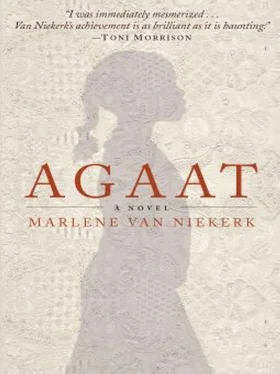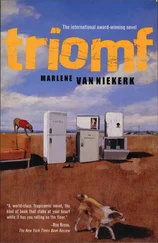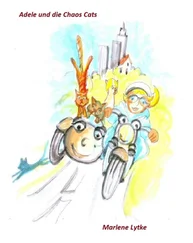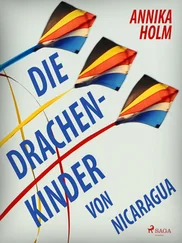Rubbish! she screeched and she up and kicked, one, two kicks into the bundle with her black school shoes so that they dispersed chow-chow.
You stood back and pretended to be coming round the corner of the house at speed.
What on earth! What’s going on here! you exclaimed.
You looked at her sternly. You picked up the bag of sweets and shared them out in the little dirty hands. You went and stood in front of her. You wanted to cover her.
You explained the cycle of the tapeworm and its stages and its contagiousness. The people looked at you in solemn resignation. You promised there would be proper toilets. You passed the medicine to the women so that they could drink themselves and dose the men. You said there would be water and a washroom. You said you would find a clean pig for the slaughter. As you were saying it, a great murmuring arose and you could see from the faces what was coming. A list without end. Water, bread, meat, milk, roofs, shoes, clothes, soap, candles, sugar, coffee.
Come, Agaat, you said, come, you must go and scrub yourself from head to toe and put on clean clothes, I don’t want Jakkie exposed to germs.
The child was on your hip. He felt heavy all of a sudden but you didn’t want to hand him over. Agaat’s apron was full of spittle and stains from the medicine and dust marks and her cap was at an angle.
Straighten your cap, you signalled with you eyes.
You felt the people looking at you, at you and your child and Agaat. She jutted out her chin and returned their stares and you wanted to say, Agaat no, one doesn’t glare like that, but you didn’t know how. You smiled ingratiatingly at the people. You wanted to apologise for her, she doesn’t know any better, you wanted to say, she’s still a child herself, you wanted to say, but they didn’t return your look and you didn’t know how you could appease them.
You thought you’d have a talk to her after lunch. You couldn’t tolerate it, the irate eyes that refused to return to normal, the footsteps that sounded too loud, the outside room whose door was slammed too loudly after she’d been to clean herself there, the new apron that was too white and starched, the cap that perched too upright on her head.
You could have asked, what’s the matter, Gaat?
She grated the carrots, garr-garr-garr, in the kitchen where the preparation of the midday meal had in the meantime fallen behind schedule. She peeled the potatoes with long strokes and vigorously turned the meat over in the pot. She served the meal quickly and without a word and excused herself to go and wash her clothes.
One-fist Punch, Jak said.
You keep out of this, you said.
You heard the zinc bath and the washboard being dragged out into the yard. You could just see how fiercely she was rubbing the apron against the corrugations. After lunch she put Jakkie in his pram as you’d asked her to do to walk him to sleep so that you could go and have a rest.
You used the child. Only through him would she become good again.
You lay open-eyed in your dark room and tried to think about the morning’s events.
Where did the words come from? You hadn’t taught her like that. Clump-arse. Pauperworms. You had heard them with your own ears. The cruel hand, the hard foot, you had seen them. You turned on your bed, you wanted to turn away from the thoughts, the images of the morning, but they wound around your head like cloths flapping loosely in the wind, obstructing your view.
Then you heard the screen door slam, the wheels of the pram over the linoleum, the frame knocking against the door-jambs, her footsteps.
She spoke rapidly. Down the passage to the bathroom with a quick rap of the knuckles on your half-open door. You heard her yank the first-aid chest from under in the first linen cupboard.
Man in the axle! In the lucerne field! Dawid has switched off the engine. Head against the rocks. They had to cut him loose! He’s bleeding, he’s hardly breathing. Come! Quickly!
That was the message, but the timbre of the voice said even more.
Get up! it said. This eternal lying down of yours! I can’t do everything on my own. It’s your farm’s botch-up. The whole botch-up of your life. It’s your life that I’m stuck with.
You felt numb. The shock seeped into you on top of the consternation of the morning that hadn’t yet subsided.
An accident, another accident!
Times without number you’d told Jak to see to it that the labourers did not bale or thresh without the tin sleeve of the axle and that they wore buttoned overalls at all times.
You hadn’t seen the axle-guard for a long time. It was extra trouble to cart it along to the fields. Must be lying forgotten somewhere in a shed.
Take a rug, you said, and water. Bring the stretcher from the storeroom.
He tried to hold onto the wheel of the trailer, his pants were winched off him, Agaat said.
You ignored the contemptuous tone, grabbed an old pair of pyjamas of Jak’s from the linen cupboard. You’d heard of this kind of accident but this was the first time on Grootmoedersdrift. A sleeve or the tail of a shirt or a loose belt is caught in the open axle and you’re flung arse over heels, round and round, limbs shimmying, head against the ground. It could be fatal if somebody didn’t press the button in time to turn off the engine.
Go and fetch the baas in the office, you said, he must phone the doctor, tell the baas to ask him what we must do here, perhaps he’d better come out himself to have a look, or send a nurse from the clinic.
She stiffened her body, jerked her head around, her mouth trembled with the effort of containing herself. She looked you straight in the eyes.
She had often had to fetch him for you, but that day something struck bedrock. It was the language. The words. She had had to speak too many languages in one day, hear too many kinds.
Baas! she wanted to say, since when suddenly? Whose ‘baas’? Yours maybe, but not mine. You, you are my baas!
Never mind, I’ll do it myself, you said and walked to Jak’s office. She followed you, came to stand behind you in the office door with Jakkie in her arms.
Julies got caught in the winch-axle, you said to Jak, he got hurt.
Says who? Says Agaat? Jak asked without looking up from under his newspaper.
It’s because the sleeve was once again not fitted, you said to Jak, it’s because they have to work with the machines in their tattered clothes, it’s because they don’t have overalls, Jak.
Jak jerked away the newspaper from his face.
The same old lamentation. Can’t you have done with it?
His back could be broken, you said.
He’s bleeding from his head, Agaat said.
The duet once again, Jak said, how about a cat’s chorus?
Jakkie started to cry. You put your arm around Agaat and the child and prodded her out of the room.
Phone the doctor, you called to Jak over your shoulder.
Agaat’s mood had still not lifted when the two of you arrived in the bakkie where Julies was lying in the lucerne field. She flung the rug over his exposed lower body.
Move your neck, move your neck, so’s we can see if it’s off! she said. You could see how Dawid looked at her. He had Julies’s clothes in his hands.
You pushed her away. The man was broken. His shirt was in tatters. The torque of the axle had stripped his pants off his legs. His shins were grazed, everywhere he was full of green stains from having been keel-hauled through the lucerne.
He groaned when you touched him.
He grabbed your hand.
I’m dying off, Nooi, he moaned.
You held the hand. You dripped water into his mouth with a piece of cotton wool.
He fainted.
You held smelling salts under his nose.
It looked as if one shoulder had been dislocated but you didn’t want to try to push it back into the socket.
Читать дальше












